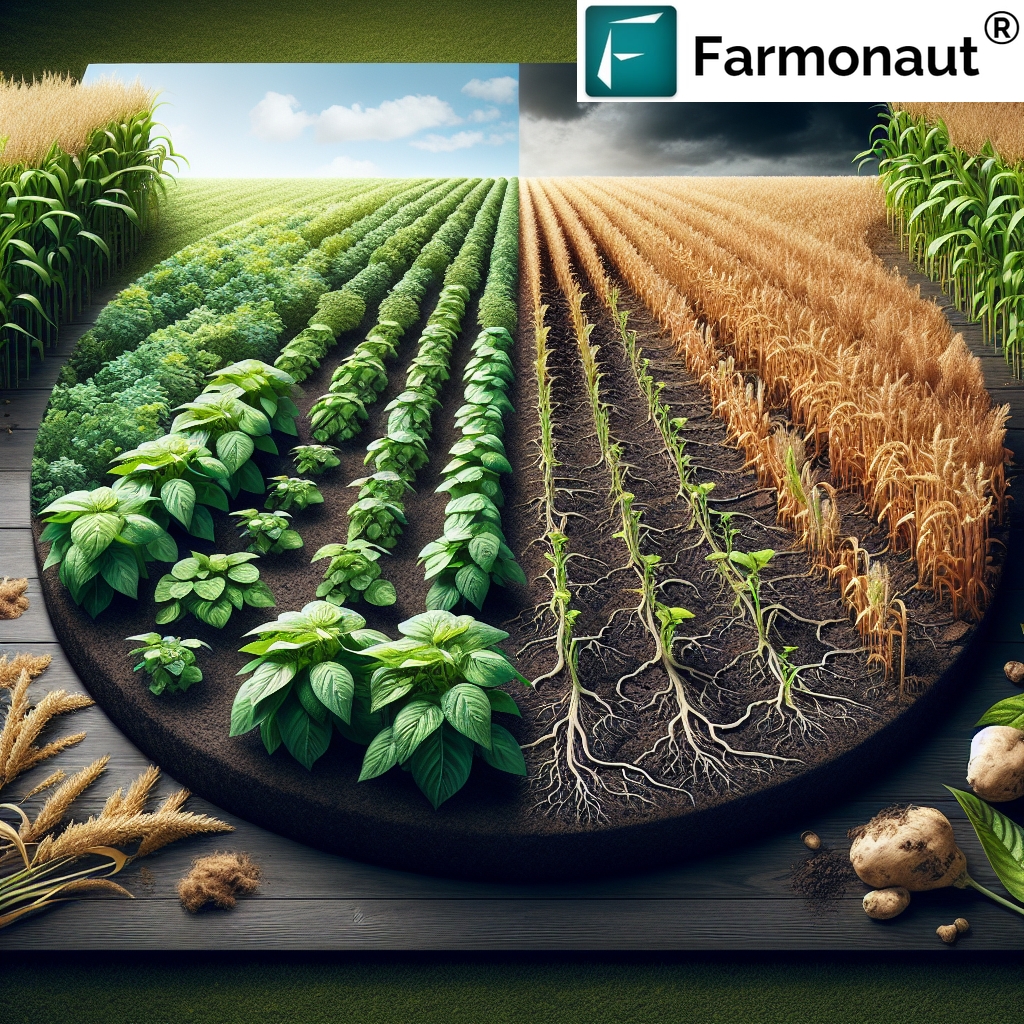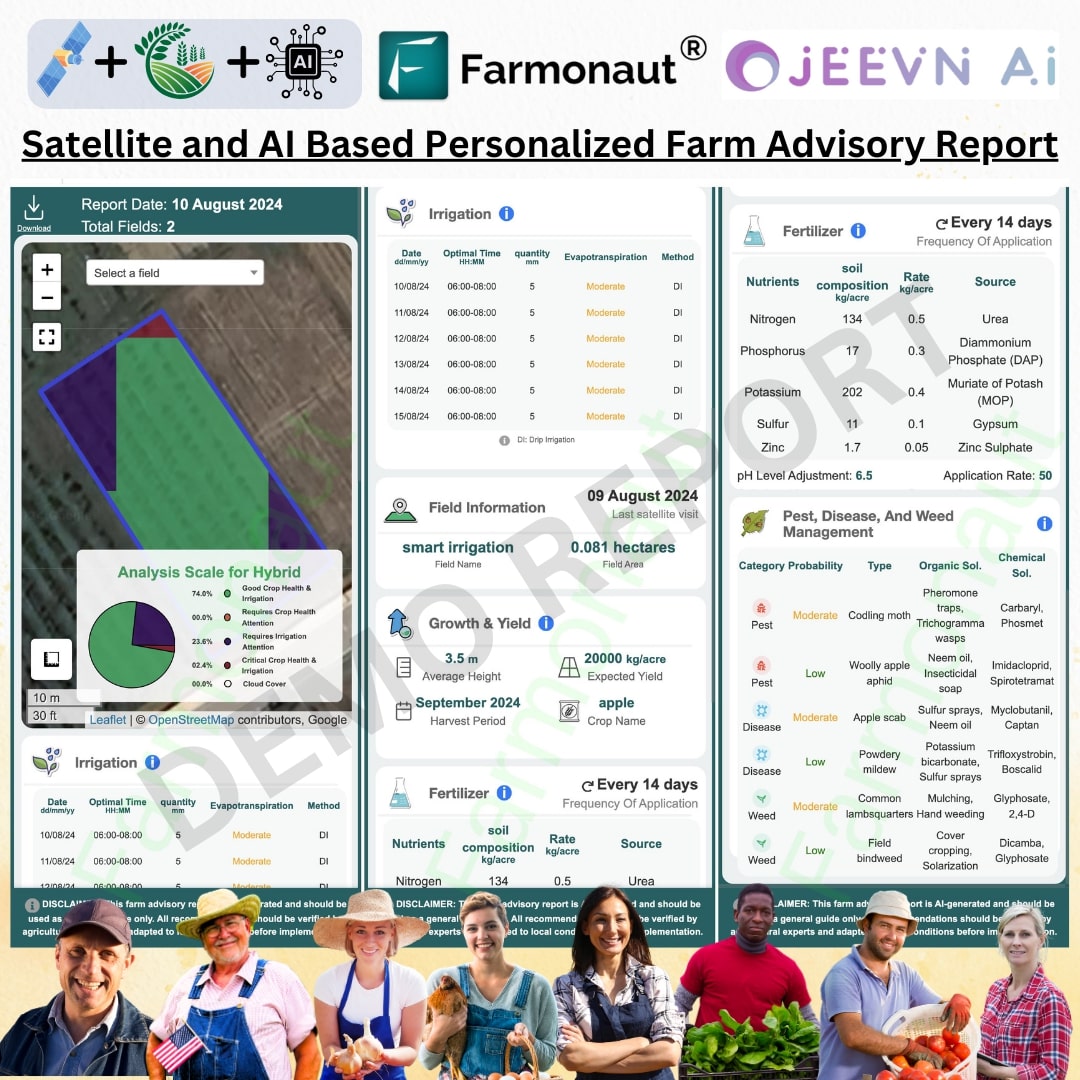The Vital Role of Organic Matter in Agriculture: Boosting Crop Production and Plant Health

In the ever-evolving world of agriculture, we at Farmonaut understand the critical importance of organic matter in maintaining healthy soils and promoting robust crop growth. As experts in agricultural technology and precision farming, we recognize that organic matter is the lifeblood of fertile soil, playing a pivotal role in sustainable agriculture and food security. In this comprehensive blog post, we’ll delve deep into the world of organic matter, exploring its significance, benefits, and how it contributes to enhanced crop production.
What is Organic Matter in Agriculture?
Before we explore the importance of organic matter, let’s first define what it is. Organic matter in agriculture refers to the carbon-based materials in soil that are derived from living organisms. These materials can be in various stages of decomposition and include:
- Plant residues (leaves, roots, stems)
- Animal remains and waste
- Microorganisms (bacteria, fungi, algae)
- Decomposed organic materials (humus)
Organic matter is a crucial component of soil, typically making up about 1-6% of its total volume in mineral soils. While this percentage may seem small, its impact on soil health and crop productivity is immense.
Why is Organic Matter Important to Plants?
Organic matter plays a multifaceted role in supporting plant growth and health. Here are some key reasons why organic matter is important to plants:
- Nutrient Supply: As organic matter decomposes, it releases essential nutrients that plants need for growth. This natural fertilization process provides a slow, steady supply of nutrients, reducing the need for synthetic fertilizers.
- Soil Structure Improvement: Organic matter helps bind soil particles together, creating a crumbly structure that allows for better root penetration and water infiltration.
- Water Retention: Soil rich in organic matter can hold more water, acting like a sponge. This increased water-holding capacity is crucial for plants during dry periods.
- pH Buffering: Organic matter helps stabilize soil pH, creating a more favorable environment for plant growth and nutrient uptake.
- Microbial Activity: It serves as food for beneficial soil microorganisms, promoting a diverse and active soil ecosystem that supports plant health.
Why is Organic Matter Important to Agriculture?
The significance of organic matter extends beyond individual plants to the entire agricultural system. Here’s why organic matter is important to agriculture as a whole:
- Sustainable Soil Management: Organic matter is key to maintaining long-term soil fertility and productivity, reducing the reliance on external inputs.
- Erosion Control: By improving soil structure, organic matter helps prevent soil erosion, preserving valuable topsoil.
- Carbon Sequestration: Soil organic matter acts as a carbon sink, helping to mitigate climate change by storing carbon in the soil.
- Biodiversity Support: A healthy soil ecosystem, fostered by organic matter, supports a diverse range of soil organisms that contribute to overall agricultural biodiversity.
- Water Quality Improvement: By reducing runoff and improving water infiltration, organic matter helps prevent water pollution from agricultural sources.
Why Organic Matter is Important for Crop Production
At Farmonaut, we emphasize the critical role of organic matter in enhancing crop yields and quality. Here’s why organic matter is important for crop production:
- Increased Yield Potential: Soils rich in organic matter generally produce higher crop yields due to improved nutrient availability and soil structure.
- Enhanced Crop Quality: The balanced nutrition provided by organic matter can lead to improved crop quality, including better taste, appearance, and nutritional value.
- Pest and Disease Resistance: Plants grown in soils with adequate organic matter tend to be more resilient to pests and diseases, reducing the need for chemical interventions.
- Drought Tolerance: The improved water-holding capacity of soils rich in organic matter helps crops withstand dry periods better.
- Extended Growing Season: Organic matter can help regulate soil temperature, potentially extending the growing season in some regions.
Measuring and Monitoring Organic Matter in Soils
At Farmonaut, we understand the importance of accurately measuring and monitoring organic matter levels in agricultural soils. While traditional methods involve laboratory analysis of soil samples, modern technology offers more efficient and comprehensive solutions.
Our satellite-based farm management system provides valuable insights into soil health, including indicators related to organic matter content. By analyzing multispectral satellite imagery, we can detect changes in soil color and texture that often correlate with organic matter levels. This technology allows farmers to monitor their soil health over large areas without the need for extensive on-ground sampling.
To learn more about how our satellite monitoring system can help you manage soil health and organic matter, visit Farmonaut’s Farm Management Platform.
Strategies for Increasing Organic Matter in Agricultural Soils
Improving soil organic matter content is a long-term process, but the benefits are well worth the effort. Here are some strategies we recommend for increasing organic matter in agricultural soils:
- Crop Rotation: Implement diverse crop rotations that include cover crops and deep-rooted plants to add variety to organic inputs.
- Reduced Tillage: Minimize soil disturbance to slow down organic matter decomposition and protect soil structure.
- Residue Management: Leave crop residues on the field after harvest to decompose and contribute to soil organic matter.
- Compost Application: Add well-decomposed compost to provide a stable form of organic matter and beneficial microorganisms.
- Green Manures: Grow and incorporate leguminous crops to add nitrogen-rich organic matter to the soil.
- Biochar Application: Consider using biochar, a stable form of carbon that can persist in soil for long periods while improving soil properties.
The Role of Technology in Organic Matter Management
At Farmonaut, we believe that technology plays a crucial role in helping farmers manage organic matter effectively. Our suite of tools includes:
- Satellite-Based Crop Health Monitoring: Our platform uses multispectral satellite imagery to assess vegetation health, which can be an indicator of soil organic matter levels.
- AI-Powered Advisory System: Our Jeevn AI system provides personalized recommendations for soil management, including practices to improve organic matter content.
- Weather Forecasting: Accurate weather predictions help farmers time their organic matter management practices for maximum effectiveness.
To explore how our technology can support your organic matter management efforts, check out our API services or download our mobile app for Android or iOS.
Farmonaut Satellite System vs. Drone and IoT-Based Farm Monitoring
While drones and IoT devices have their place in modern agriculture, Farmonaut’s satellite-based system offers unique advantages for monitoring soil health and organic matter. Here’s a comparison:
| Feature | Farmonaut Satellite System | Drone-Based Monitoring | IoT-Based Monitoring |
|---|---|---|---|
| Coverage Area | Large scale (hundreds to thousands of hectares) | Medium scale (tens to hundreds of hectares) | Small scale (point measurements) |
| Frequency of Data Collection | Regular (every few days, depending on satellite revisit time) | As needed (requires manual flights) | Continuous (real-time data possible) |
| Initial Investment | Low (subscription-based service) | High (equipment purchase required) | Medium to High (sensors and network setup) |
| Operational Complexity | Low (cloud-based platform) | High (requires trained operators) | Medium (requires maintenance and troubleshooting) |
| Data Analysis | Advanced (AI and machine learning integration) | Moderate (depends on software used) | Variable (depends on system capabilities) |
Case Studies: Successful Organic Matter Management with Farmonaut
While we don’t have specific case studies to share, our platform has helped numerous farmers improve their soil organic matter management. By providing regular insights into crop health and soil conditions, we’ve enabled farmers to make informed decisions about organic matter inputs and soil management practices.
The Future of Organic Matter in Agriculture
As we look to the future, the importance of organic matter in agriculture is only set to increase. Climate change, soil degradation, and the need for sustainable food production are driving a renewed focus on soil health and organic matter management.
At Farmonaut, we’re committed to developing innovative solutions that help farmers optimize their organic matter management strategies. Our ongoing research and development efforts are focused on:
- Improving the accuracy of satellite-based soil organic matter estimation
- Developing AI models that can predict the impact of different management practices on soil organic matter levels
- Creating user-friendly tools that make it easier for farmers to implement organic matter management strategies
To stay updated on our latest developments and how they can benefit your farming operations, consider subscribing to our services:
Conclusion
Organic matter is the foundation of healthy soils and productive agriculture. Its importance cannot be overstated, from providing essential nutrients to plants to improving soil structure and water retention. As we face the challenges of feeding a growing global population while preserving our natural resources, effective organic matter management will be key to sustainable agriculture.
At Farmonaut, we’re proud to be at the forefront of agricultural technology, providing farmers with the tools they need to monitor and manage their soil health effectively. By combining satellite technology, AI, and agronomic expertise, we’re helping to create a more sustainable and productive agricultural future.
To learn more about how Farmonaut can support your organic matter management efforts, visit our API documentation or contact our team of experts.
FAQs
-
Q: How long does it take to increase soil organic matter?
A: Increasing soil organic matter is a long-term process that can take several years to decades. The rate of increase depends on factors such as climate, soil type, and management practices. -
Q: Can organic matter be added to soil too quickly?
A: Yes, adding too much organic matter too quickly can lead to nutrient imbalances and potentially harm plant growth. It’s best to increase organic matter gradually over time. -
Q: How does climate change affect soil organic matter?
A: Climate change can impact soil organic matter in various ways, including accelerating decomposition rates in warmer temperatures and altering vegetation patterns that contribute to organic matter inputs. -
Q: Is all organic matter equally beneficial to soil?
A: Not all organic matter is equally beneficial. The quality and composition of organic matter can vary, with some forms being more stable and beneficial for long-term soil health than others. -
Q: How can Farmonaut’s technology help me manage soil organic matter?
A: Farmonaut’s satellite-based monitoring system can help you track indicators of soil health over time, allowing you to assess the impact of your organic matter management practices and make data-driven decisions.


